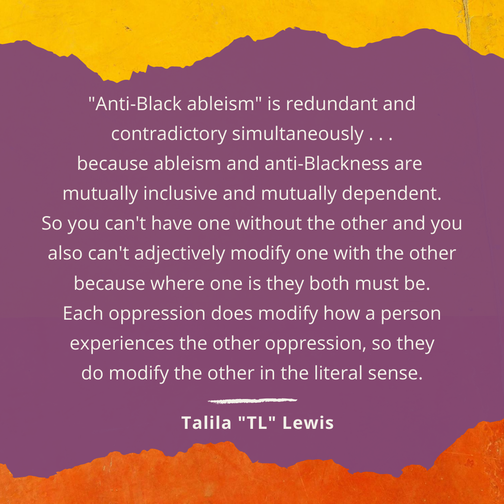 Image of a quote from the piece with purple rust, and yellow background: "Anti-Black ableism" is redundant and contradictory simultaneously . . .because ableism and anti-Blackness are mutually inclusive and mutually dependent. So you can't have one without the other and you also can't adjectively modify one with the other because where one is they both must be. Each oppression does modify how a person experiences the other oppression, so they do modify the other in the literal sense. Many people quote my definition of ableism without providing context into what it means to say that ableism is formed and informed by anti-Blackness.
Many also say, sign, write these words without providing necessary nuance about what this truth means for how ableism is uniquely wielded against Black people. So while people finally seem to be coming around to believing that ableism is inherently anti-Black, they are still gliding right past how this heart connection between ableism and racism means that ableism hits real different for Black people and racism hits real different for Black disabled people. Relatedly, many people have asked me why I do not use the term "anti-Black ableism." I am encouraged by attempts to integrate these truths into folks' analysis of ableism and by continued curiosity. I also want to name that we still must collectively develop more nuanced words, signs and frameworks for these conversations to be had appropriately and justly. I will offer a bit here and expand if/when I have more capacity and more thoughts. Black disabled people, especially, are encouraged to think and language and build and convene and discuss and challenge so we can collectively come into more understandings of ourselves our experiences our journeys our hearts. I will begin here: Anti-black racism exists because “anti-Black” modifies racism, a word and practice that can and does apply to various and multiple negatively racialized groups. For instance, Native/Black peoples, Latinx peoples, Hmong peoples all experience racism specific to complexion, appearance, cultural, community, religious, and other practices, etc. Similarly, misogynoir expands on a particular kind of misogyny—the kind which is experienced by Black women/femmes. But why would we use “anti-Black” to modify ableism when by its definition, at least in the US context, anti-Blackness is at the heart of ableism? See working definition of ableism here, and context for this definition here. In short, since ableism is inherently anti-Black, I try my best not use the term "anti-Black" to modify ableism. "Anti-Black ableism" is redundant and contradictory simultaneously. That sounds weird, I know. It's because ableism and anti-Blackness are mutually inclusive and mutually dependent. So you can't have one without the other and you also can't adjectively modify one with the other because where one is they both must be. Each oppression does modify how a person experiences the other oppression, so they do modify the other in the literal sense. That said, I really do appreciate that "anti-Black ableism" has been developed to try to focus on how Black non-disabled people, Black disabled people, and Black people who are labeled disabled (in good or in bad faith) are treated in every sense of the word. I know that there is something more needed to make this very unique experience that Black people have with ableism more clear. Still, I believe “anti-Black ableism” does not succeed in achieving the necessary clarity and that it may cause more harm to the effort being sought by those using the term. There is no doubt that ableism absolutely hits different when wielded against Black people and Black communities. It’s justification of deprivation, depravity, murder and mayhem against Black/disabled peoples. It’s debasement, dehumanization and mass murder of the cruelest intensity and largest magnitude. All “justified” by racialized notions of delinquency, dependency, defectiveness as determined by white supremacists and their governments, corporations, medical/carceral institutions that directly and indirectly benefit from continued subjugation and criminalization, extraction and commodification, diagnosing and destruction of our most marginalized people and communities. We must find ways to name how ableism is uniquely felt and experienced by Black people or we are not doing justice to how the long term inescapable and inextricable bond between racism and ableism places Black non-disabled people, Black disabled people, and Black people who are labeled “disabled” in mortal danger with no recourse. I do wonder what other Black disabled folks thoughts are on this. What word or phrase can be collectively created to explain how Black people experience a racially magnified or racially manipulated or informed ableism?
3 Comments
D'Arcee Charington Neal
8/1/2022 10:44:56 am
I was recommended to your definition by Simi Linton and I think it is very interesting. I also think your commentary about there not being a good enough word to encompass the feelings of ableism and blackness together. My PhD work is about this very issue, and definitionally, I call it "Afrophantasm," which is a more specific terminology that narrows into the spectrality of what ableism does to black disabled people when it is ignored/overlooked/misused/unrecognized. Admittedly I have to take more time to think about the idea of anti-black ableism as a redundant idea which I gather is postured around the concept of bodies inherently being raced by value, but I also know that the value of said bodies varies wildly depending upon geographic location, and historical upbringing. Speaking only in relation to black American disability and its specific connection to chattel slavery/productivity and labor, the consideration of ableism outside of disability a harder sell (even if it is categorically true since the value of bodies has no determination as to whether they function 'appropriately' or not) and therefore, perhaps that is why ableism can be used outside of disability? Am I thinking about that wrong?
Reply
Valaree
3/6/2024 04:13:19 pm
Eloquently stated, Ms. Lewis.
Reply
Leave a Reply. |
AuthorI dream incessantly of justice. Hoping to calm my mind & stir yours through this freedom space. Archives
July 2024
Categories |
 RSS Feed
RSS Feed